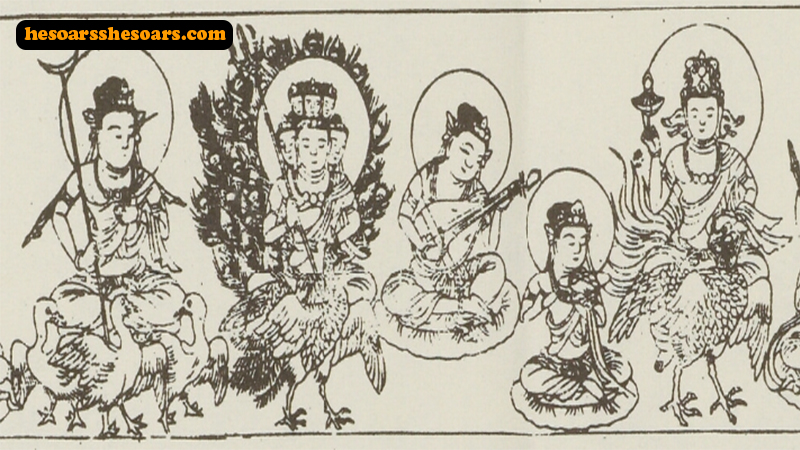Benzaiten The Japanese Goddess. Also known as Benten. Is a prominent goddess in Japanese mythology. Revered for her association with water. Wisdom, and the arts. She embodies various aspects. As a beautiful. Woman playing a shamisen (a traditional stringed instrument) or a flute. In this article, we will delve deeper into Benzaiten. Her role in Japanese mythology, and how her influence can.
Origin and History of Benzaiten The Japanese Goddess
Benzaiten has its roots in Hindu. To Japan during ancient times. Through the propagation of Buddhism. Originally known as Saraswati in Hinduism. She made her way into Japanese belief systems, adapting to local customs and syncretizing with indigenous deities.
Her name, “Benzaiten,” is a Japanization of the Sanskrit word “Saraswati.” In Japanese mythology. Lucky Gods (Shichifukujin). A group of deities associated with good fortune and prosperity. Over time, Benzaiten became a prominent figure in Japanese Buddhism, Shintoism, and folklore.
Attributes and Symbolism Benzaiten The Japanese Goddess
Benzaiten. Is celebrated. For her multifaceted attributes. Each representing different aspects of life and culture. Here are some of her key associations:
- Goddess of Water: Benzaiten is primarily recognized as the goddess of water. Her connection to water symbolizes its vital role in nourishing life, supporting agriculture, and representing the flow of knowledge and creativity.
- Goddess of Wisdom: As a deity of wisdom, she embodies knowledge, learning, and eloquence. Scholars and artists often invoke her blessings for inspiration and success in their pursuits.
- Goddess of the Arts: Benzaiten is a patron of the arts. Particularly music, poetry, and dance. Her association with musical instruments like the shamisen and flute underscores her influence on Japanese classical music and traditional performing arts.
- Protector of Love and Relationships: In popular culture, Benzaiten is sometimes regarded as a deity who can influence matters of love and relationships. People seek her blessings for harmonious partnerships and romantic endeavors.
- Guardian of Rivers and Water Bodies: Many shrines dedicated to Benzaiten are located near rivers, ponds, and other water bodies, signifying her role as a guardian and protector of these natural resources.
Cultural Significance ( Benzaiten The Japanese Goddess )
Benzaiten’s influence extends beyond mythology and religion into various aspects of Japanese culture:
- Shrines and Festivals: Benzaiten is enshrined in. Numerous temples and shrines across Japan. One of the most famous is the Enoshima Shrine in Kanagawa Prefecture, located on an island dedicated to her worship. Festivals and rituals. Are held to honor her. Often featuring music and dance performances.
- Music and Arts: Her association with the arts has left a lasting impact on traditional Japanese music. Such as the koto and shamisen. As well as dance forms like Noh and Kabuki. Artists and musicians often pay tribute to her for inspiration and skill.
- Water Conservation: Given her role as the goddess of water. Benzaiten’s presence is felt in efforts to conserve and. Protect water resources in Japan. Many initiatives and organizations draw inspiration from her symbolism to promote responsible water management.
- Love and Relationships: Some people still turn to. Benzaiten for guidance in matters of love and matchmaking. Seeking her blessings for happy and successful unions.
In conclusion
Benzaiten, the goddess of water. Wisdom, and the arts, holds a unique and enduring place in Japanese mythology and culture. Her multifaceted nature reflects the diverse aspects of human existence, and her influence continues to resonate in various facets of Japanese life, from the arts to spirituality and beyond.




